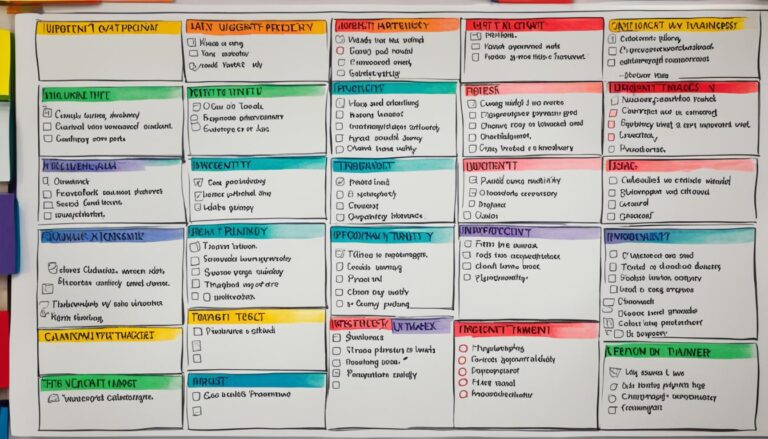Empower Your Leadership with Time Management Skills

Do you ever find yourself constantly busy but not achieving the results you desire as a leader? Are you struggling to effectively manage your time amidst a sea of tasks and responsibilities? It’s time to challenge the conventional beliefs about time management in leadership and discover the key to unlocking your true potential.
Time management is not just about ticking off items on a to-do list. It’s about utilizing your limited time in the most effective and efficient way possible, ensuring that you focus on the right tasks that drive meaningful results.
In this article, we will delve into the critical role of time management in leadership and provide you with practical strategies to enhance your productivity and achieve your leadership goals.
Key Takeaways:
- Effective time management is crucial for leaders to achieve better results and maximize productivity.
- Identify and eliminate common time-wasters such as procrastination and lack of prioritization.
- Implement time-saving techniques like goal setting and breaking tasks into smaller manageable chunks.
- Prioritize your responsibilities and avoid over-commitment to prevent burnout.
- Optimize meeting management to make the most of everyone’s time and maintain focus and productivity.
The Role of Prioritization in Time Management for Leaders
Prioritization is a crucial element of effective time management strategies for leaders in any organization. When leaders prioritize tasks and activities, they can make the most efficient use of their time and resources, leading to increased productivity and better outcomes. Prioritization allows leaders to focus on what truly matters, guiding their decision-making and ensuring that they align their efforts with the organization’s objectives.
One of the first steps in prioritization is defining and communicating the priorities of the organization to team members. By clearly outlining what needs to be accomplished and the order of importance, leaders can create a framework for decision-making and task allocation across the team. This transparency and clarity help to minimize confusion and ensure that everyone is working towards the same goals.
Encouraging a culture of priority-driven work is essential for effective time management techniques. By fostering an environment where team members understand the importance of prioritizing tasks, leaders can ensure that the most critical tasks are addressed first. This approach frees up time and resources to focus on strategic objectives, leading to overall organizational success.
Leaders must also be realistic about their own and their team members’ commitment levels to avoid over-committing and experiencing burnout. By assessing their resources and capacity, leaders can assign tasks in a manner that allows everyone to work at an optimal level without feeling overwhelmed. This practice promotes a balanced workload, which contributes to job satisfaction and improved productivity.
Overall, prioritization plays a vital role in time management for leaders. By setting clear priorities, communicating them effectively, and ensuring realistic commitments, leaders can make the most efficient use of their time and achieve desired results. Let’s explore the importance of effective meeting management in the next section.

Prioritization Techniques for Leaders
| Technique | Description |
|---|---|
| Eisenhower Matrix | A framework for categorizing tasks based on their urgency and importance to determine priorities. |
| ABC Analysis | Assigning tasks into categories A, B, or C based on their level of importance to prioritize accordingly. |
| Pareto Principle | Focusing on the 20% of tasks that contribute to 80% of the results, maximizing impact and efficiency. |
| Ranking and Scoring | Assigning numerical values to tasks based on their importance, urgency, and alignment with organizational goals. |
Effective Time Management in Meetings
Meetings can be a valuable tool for leaders, providing an opportunity for collaboration, decision-making, and information sharing. However, without proper time management, meetings can quickly become unproductive and consume valuable resources. As a leader, it is crucial to optimize your time in meetings and ensure that they contribute to the overall success of your team and organization.
The Importance of a Clear Agenda and Purpose
One of the common time management issues in meetings is the lack of a clear agenda and purpose. When there is no defined objective or actionable plan, meetings can easily veer off-topic or become inefficient. To maximize everyone’s time and productivity, it is essential to create a clear agenda that outlines the topics to be discussed and the goals to be achieved. This way, participants can come prepared, and the meeting can stay focused and on track.
Invite Only Relevant Participants
Another time-saving tip for effective meeting management is to invite only the relevant participants. Including unnecessary attendees not only stretches the duration of the meeting but also diverts attention from the main topics at hand. Evaluate who truly needs to be present based on their role, expertise, or involvement in the subject matter. By keeping the meeting concise and involving the right people, you can ensure that time is utilized efficiently.
Set Boundaries for Electronic Distractions
In today’s digital age, electronic distractions, such as emails and notifications, can significantly impact meeting productivity. As a leader, it is your responsibility to set boundaries and encourage a focused environment during meetings. Consider implementing a no-email or no-notification policy during meeting sessions to promote active engagement and limit interruptions. By minimizing distractions, you can enhance collaboration and make the most of everyone’s time.
Track and Manage Time
Time management during meetings involves tracking and managing the allocated time for each agenda item. Assign specific time slots for discussions, presentations, and decision-making to ensure that they stay within the allotted timeframe. Encourage participants to stick to the schedule and avoid going off on tangents. By actively managing time, you can prevent meetings from running over and ensure that everyone’s time is respected.
Implementing these time management tips for leaders in meetings can improve efficiency, foster productive discussions, and drive better outcomes. By setting a clear agenda, inviting relevant participants, minimizing electronic distractions, and actively managing time, you can make the most of every meeting and create a culture of effectiveness within your team.

The Impact of Time Management on Leadership Productivity
Effective time management is a critical factor in enhancing leadership productivity. When leaders prioritize tasks wisely and set realistic commitments, they can prevent overcommitment and ensure the timely completion of important deadlines. By effectively managing their time, leaders can allocate resources efficiently, delegate tasks when necessary, and focus on strategic priorities.
Delegation is an essential time management strategy for leaders. By entrusting specific responsibilities to capable team members, leaders can not only lighten their own workload but also empower their team to contribute effectively. Delegating tasks allows leaders to concentrate on high-level decision-making and strategic planning, leading to increased productivity and better outcomes.
An important aspect of time management for leaders is managing distractions. In today’s fast-paced digital world, excessive email checking and constant interruptions from social media notifications can hinder productivity. Leaders can combat distractions by setting clear expectations with their team members and establishing guidelines for electronic communications during designated work periods. By minimizing distractions, leaders can maintain focus and optimize their productivity.
Mastering effective time management skills enables leaders to make the most of their limited resources and achieve optimal productivity levels. By prioritizing tasks, delegating effectively, and managing distractions, leaders can unlock their full potential and lead their teams to success.

Key Strategies for Effective Time Management in Leadership:
- Set Priorities: Clearly define and communicate the most important tasks to ensure efficient resource allocation and goal achievement.
- Delegate Tasks: Trust and empower qualified team members to handle specific responsibilities, freeing up time for strategic leadership activities.
- Manage Distractions: Establish guidelines and expectations for electronic communications to minimize interruptions and maintain focus.
Benefits of Effective Time Management for Leaders:
- Increased Productivity: Efficiently utilizing time leads to heightened productivity and the ability to accomplish more in less time.
- Enhanced Decision-Making: With fewer time constraints and distractions, leaders can make well-informed decisions and prioritize strategic objectives.
- Better Work-Life Balance: By effectively managing time, leaders can maintain a healthy balance between work and personal life, reducing stress and optimizing performance.
Conclusion
Time management is an essential skill for effective leadership. By mastering time management techniques, you can enhance your leadership skills and drive better results. Prioritization plays a key role in managing your time effectively. By understanding your organization’s priorities and aligning your efforts, you can make informed decisions and achieve strategic objectives.
Effective time management in meetings is crucial for maximizing productivity. By setting clear agendas, inviting relevant participants, and staying focused, you can ensure that meetings are productive and efficient. Avoiding distractions like checking emails and notifications during meetings helps maintain concentration and drive better outcomes.
Remember, time management is not just about managing your own time but also about managing commitments and expectations. Being realistic about your own and your team’s commitments helps avoid overloading and burnout. Delegating tasks when necessary and setting boundaries for distractions are key strategies to optimize your time and productivity.
By implementing time-saving strategies and eliminating time-wasting activities, you can unlock your full leadership potential. Empower yourself and your team by mastering time management skills and watch your efficiency, productivity, and focus soar to new heights. Start today and embark on a journey towards becoming a more effective leader.
FAQ
Why is time management important in leadership?
Time management is crucial for leaders to effectively manage their limited time and be more productive. It helps leaders analyze how time is spent and implement time-saving methods to gain more time.
What are some common time wasters for leaders?
Some of the biggest time wasters for leaders include procrastination, lack of prioritization, and ineffective planning.
How can leaders improve their time management skills?
Leaders can improve their time management skills by setting goals, breaking tasks into smaller manageable chunks, and avoiding perfectionism.
How can leaders prioritize effectively?
Prioritization is the cornerstone of effective time management for leaders. They can prioritize effectively by defining and communicating the priorities of the organization to the team members.
How can leaders manage meetings efficiently?
To manage meetings efficiently, leaders should have a clear agenda, invite only relevant participants, and ensure that the meeting serves a purpose. They should also set boundaries for distractions during meetings.
How does effective time management impact leadership productivity?
Effective time management helps leaders avoid overcommitting and ensures that important deadlines are met. It also allows leaders to delegate tasks and manage distractions, enhancing their focus and productivity.
How can leaders empower their teams with time management skills?
By mastering time management skills, leaders can empower their teams to be more efficient, productive, and focused. They can do this by implementing time-saving strategies and avoiding time-wasting activities.






